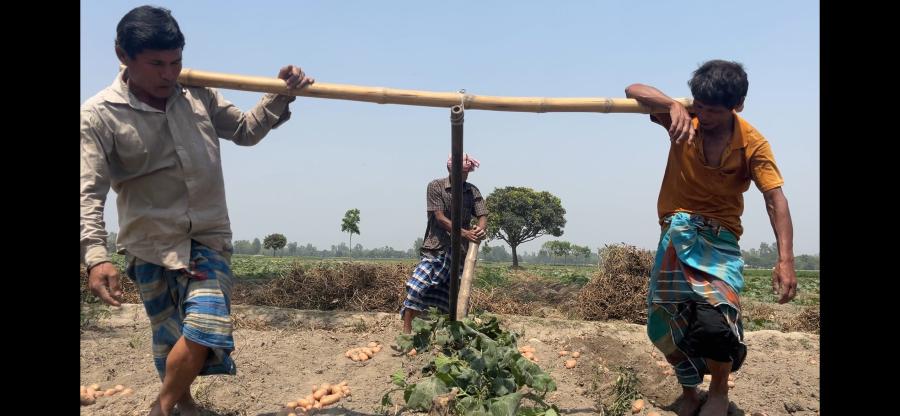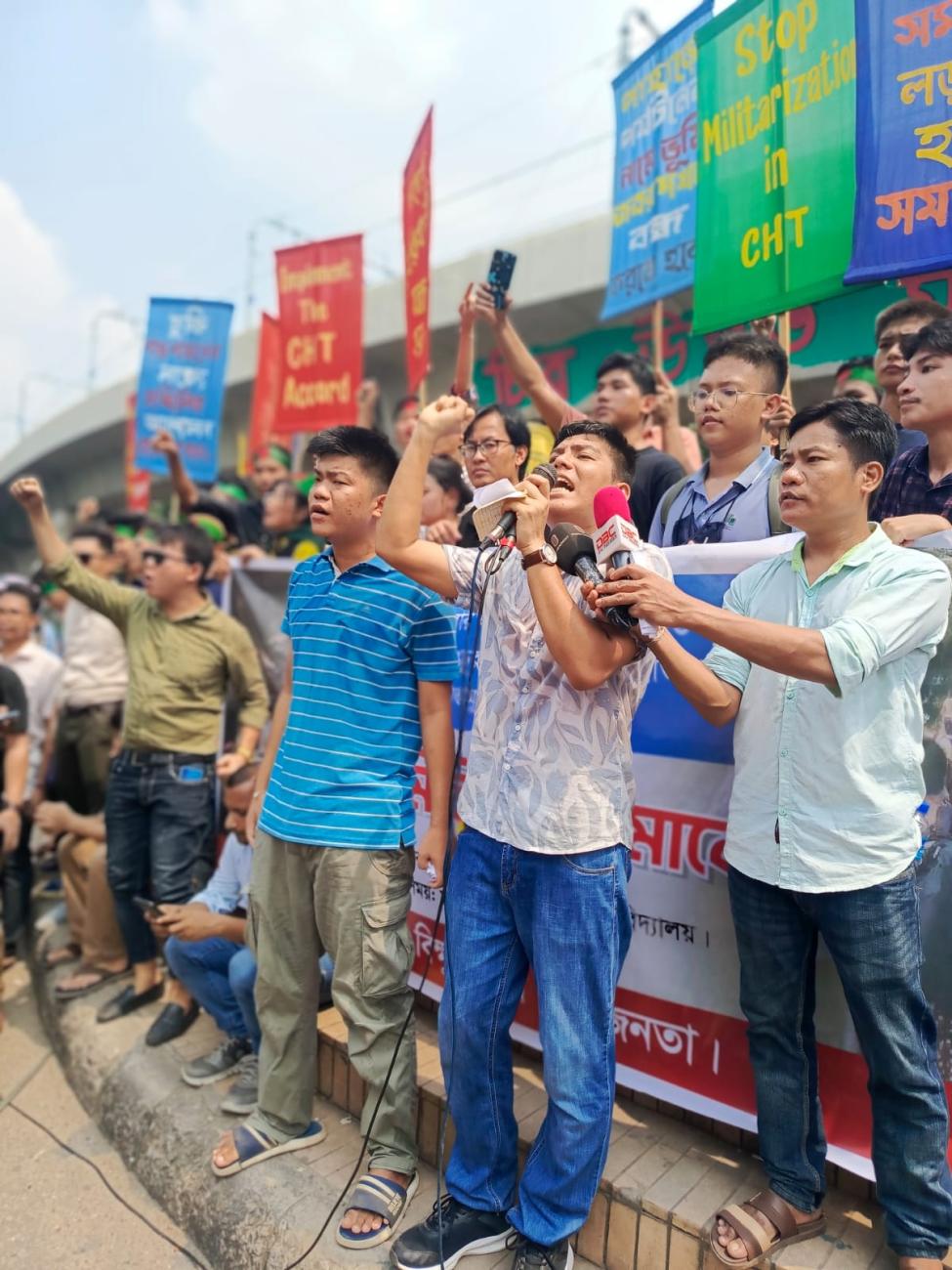
By Dev Kumar Sunuwar (Koĩts-Sunuwar, CS Staff)
The Chittagong Hill Tracts (CHT), a region in Bangladesh long troubled by communal conflict, continues to experience alarming incidents of violence, deepening divisions between various factions and contributing to ongoing tensions between the Bengali settlers and Indigenous communities. Most recently, on September 19 and 20, 2024, heavy gunfire and communal violence erupted in the Khagrachari and Rangamati districts, where a mob of Bengali settlers allegedly launched coordinated attacks against Indigenous Jumma communities. Several Jumma Indigenous people’s homes and businesses suffered looting and burning, leading to four deaths and several injuries.
The unrest in CHT, which borders India and Myanmar in the southeast of Bangladesh, started after the death of a Bengali settler named Mohammad Mamun on September 18, 2024. This triggered violent reprisals against the Jumma people. Bengali settlers have subjected Indigenous Peoples to a series of gruesome and random attacks, contributing to the ongoing instability that has plagued the region for decades.
On September 18, a mob reportedly caught and allegedly beat Mohammad Mamun, a Bengali settler with a criminal history, on suspicion of motorbike theft in the Nowapara area of Khagrachari Sadar. According to Abdul Baten Mridha, the officer in charge of Khagrachari Police Station, Mamun died after crashing into an electric pole while fleeing the scene on the stolen motorcycle. Police also confirmed that Mamun had 14 theft charges and two narcotics cases filed against him, but his death sparked retaliatory attacks against the Jumma people.
In the aftermath of Mamun’s death, Bengali settlers blamed the Indigenous Jumma community and organized protest processions in Dighinala on September 19. The protest soon devolved into violence as settlers indiscriminately attacked Jumma individuals and set fire to their homes and businesses in the Dighinala Station area. Local media reports claim that settlers set ablaze more than 100 houses and businesses, primarily belonging to the Indigenous Chakma and Jumma people.
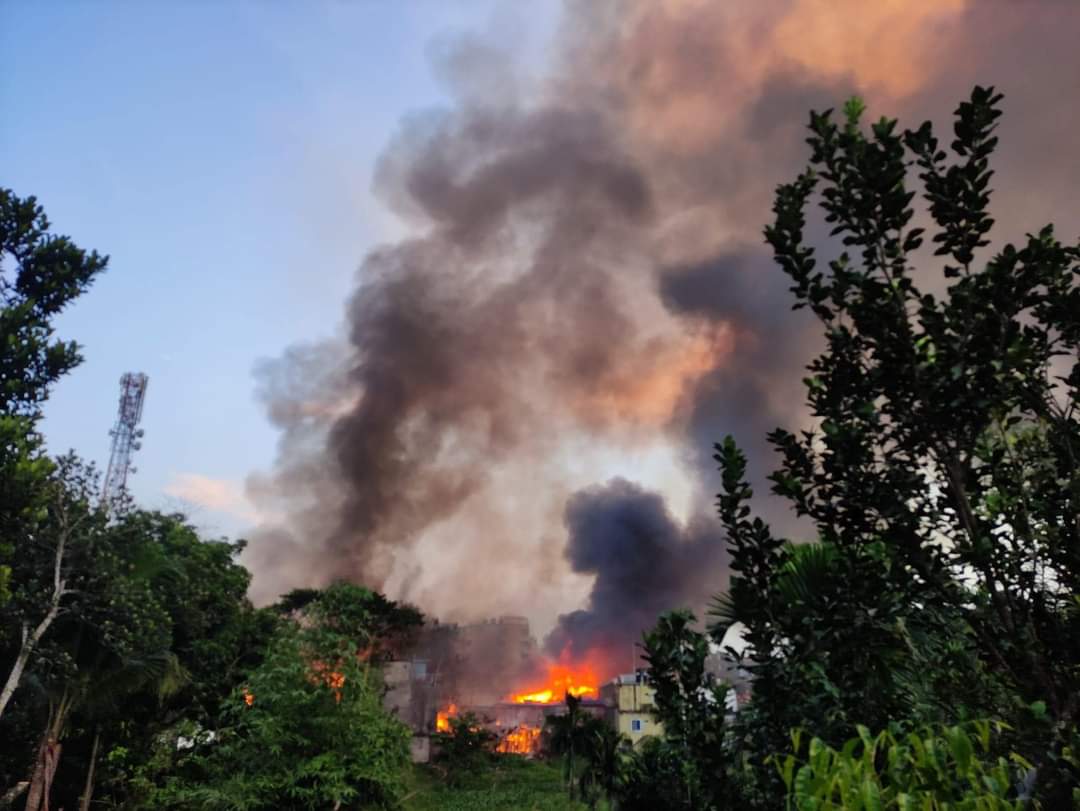
Photo by Ripon Changma.
Later that night, a group of Jumma students and youth blocked the Khagrachari-Panchari road at Swanirvor and Narankheya areas to protest the violence in Dighinala. Tensions escalated when military personnel arrived, and witnesses allege that the army opened fire, resulting in the deaths of two Indigenous youths and injuring at least nine others. Chittagong Medical College Hospital treated four critically wounded individuals. Dhananjoy Chakma (50), Junan Chakma (22), and Rubel Tripura (24) were the victims of the September 19 violence.
On September 20, Indigenous Jumma students under the Hill Student Movement Against Conflict and Discrimination organized a protest rally in Rangamati, where Bengali settlers continued the violence. The peaceful rally was disrupted, causing violence to spread throughout the city. Settlers torched Indigenous-owned homes and businesses in several areas, including Kalindipur, Bijon Sarani, Dewan Para, Tridip Nagar, and Banarupa. During the chaos, settlers vandalized and set on fire the Chittagong Hill Tracts Regional Council office, looting and damaging the Moitri Bihara Buddhist temple in Kathaltoli. Anik Kumar Chakma (22), a Jumma student, lost his life during the violence near the New Market area. The destruction displaced many Indigenous families.
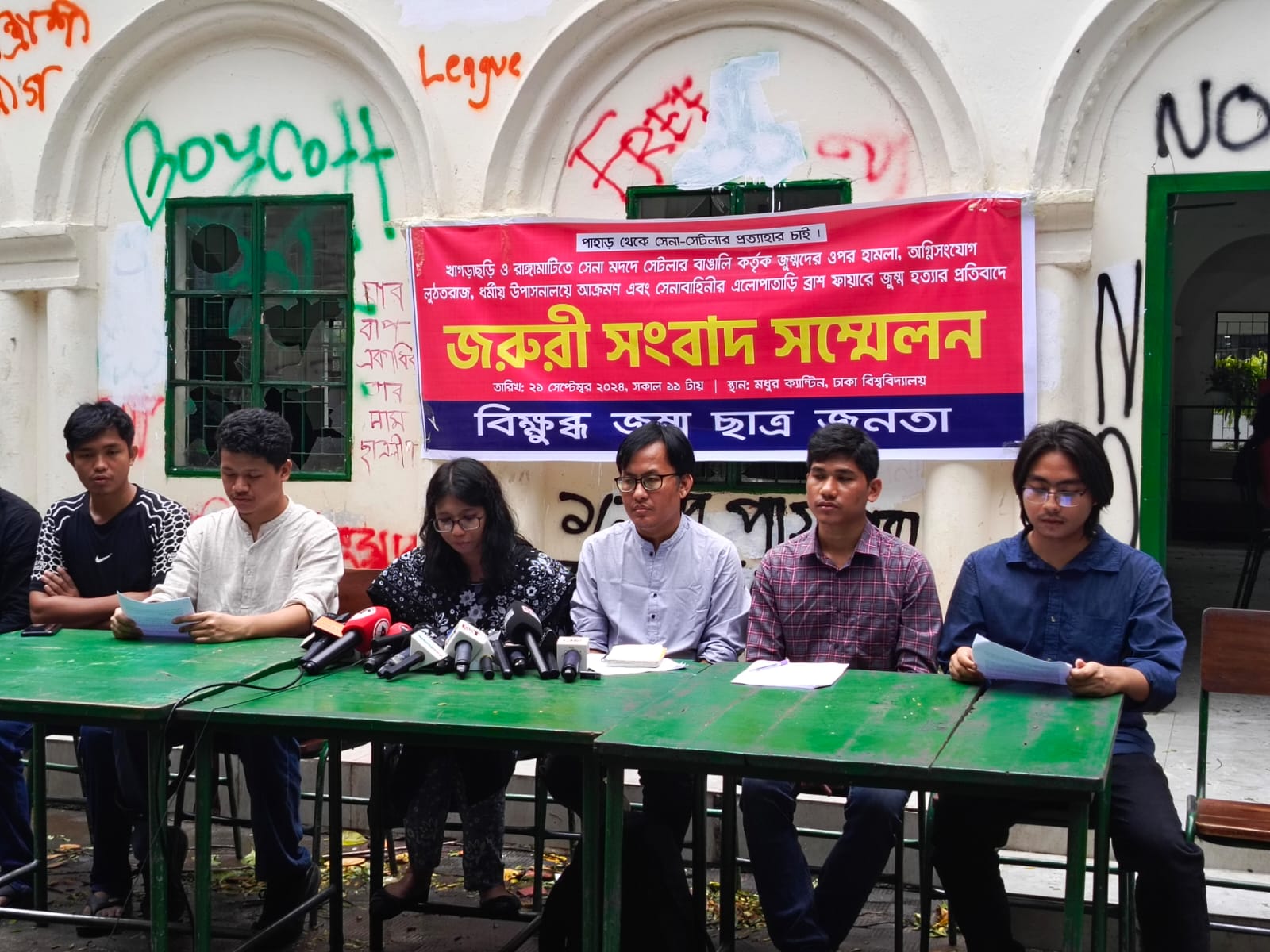
Photo by Satej Chakma.
On September 20, the Rangamati, Khargrachari, and Bandurban District Magistrate, representing the local administration, enforced Section 144 of the Criminal Procedure Code of 1898. However, on September 22, they lifted this legal order, which prohibited public gatherings and assemblies in Rangamati and Khagrachari to contain the unrest.
Following the attacks in Khagrachari and Rangamati, protests erupted in different parts of the country. In Chittagong, Indigenous communities gathered at Cheragi Pahar to condemn the violence, calling for exemplary punishment for the perpetrators. In Dhaka, thousands of Indigenous people held a demonstration at Dhaka University, demanding an impartial investigation into the attacks, the withdrawal of military forces from the CHT, and the immediate implementation of the 1997 Chittagong Hill Tracts Accord. Protesters later blocked the Shahbagh intersection in Dhaka for a half-hour sit-in.
Protests also took place at Jahangirnagar University, where Indigenous students blocked the Dhaka-Aricha highway in solidarity with the victims of the attacks. In Rajshahi, Indigenous students from Rajshahi University and Rajshahi University of Engineering and Technology gathered on Paris Road to protest the violence and demand peace and justice.
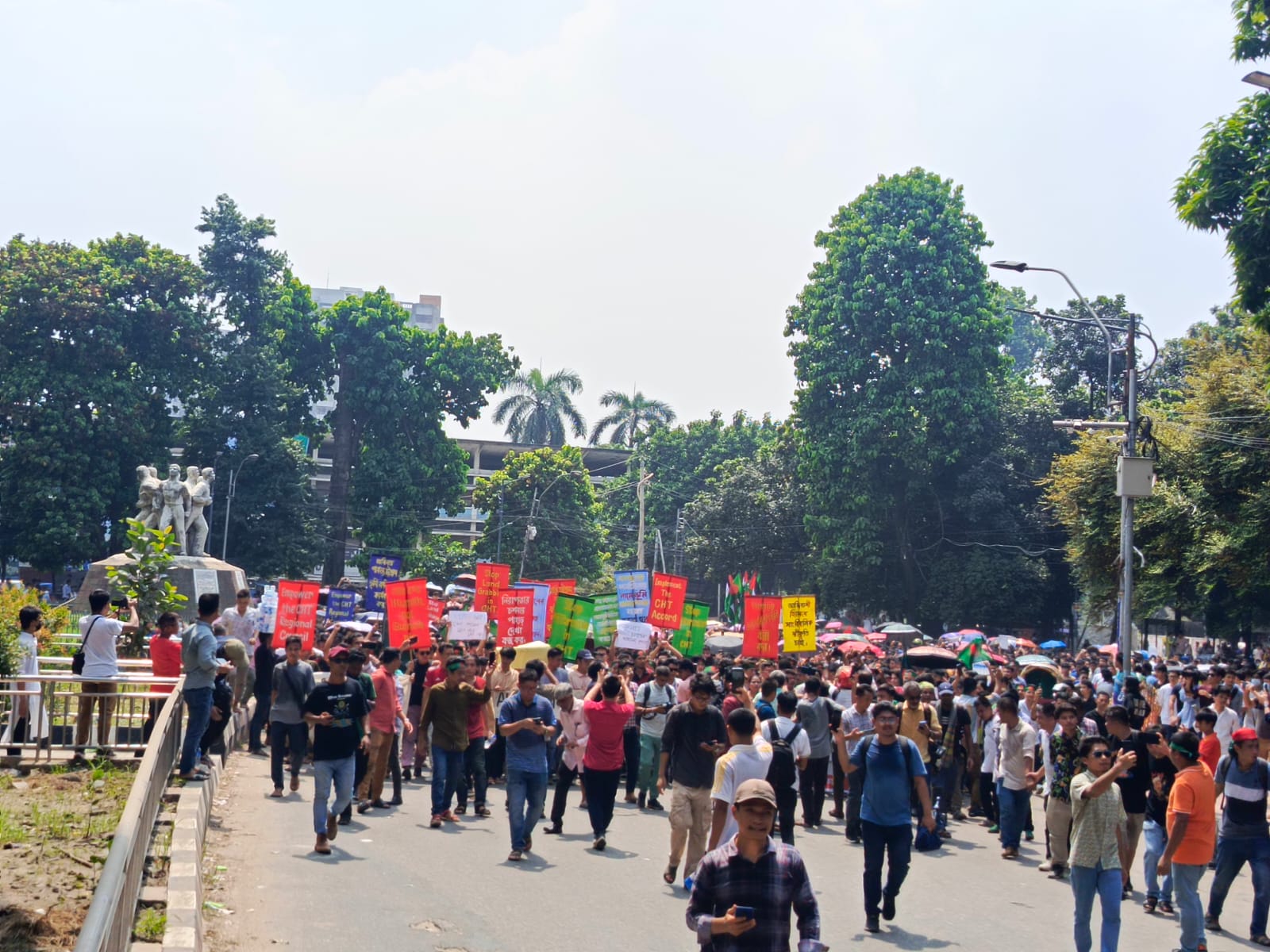
Photo by Satej Chakma.
In response to the escalating unrest, the Chief Adviser's office of the interim government of Bangladesh issued a statement on September 20, urging citizens in the CHT to remain calm and maintain peace. The statement reassured the public that the perpetrators would face justice. It announced compensation for the families of the deceased, free treatment for the injured, and compensation for destroyed houses and businesses.
On September 21, a high-level government delegation led by Home Affairs Adviser Lieutenant General (retired) Jahangir Alam Chowdhury visited Rangamati and Khagrachari to assess the situation. The delegation, which included CHT Ministry Adviser Supradip Chakma and Land and Local Government Minister AF Hasan Arif, met with local leaders, law enforcement agencies, and the CHT Regional Council. They called for peace and harmony in the region and promised a thorough investigation into the recent violence and to take action against the perpetrators. However, no significant arrests have raised doubts about the justice system.
Despite the government's assurances, the situation remains tense. The government has instructed law enforcement agencies to exercise restraint and announced the formation of a high-level probe body to investigate the incidents. "We are still assessing the scale of the destruction, and the Indigenous communities are living in fear," says Pallab Chakma, the Executive Director of the Kapaeeng Foundation, a human rights organization in Bangladesh. "There are reasons to doubt the government's promises to form probe committees in response to several incidents. Similar incidents in the past have led to the production of reports and the identification of perpetrators, yet no action has followed. I am also skeptical about the current situation."
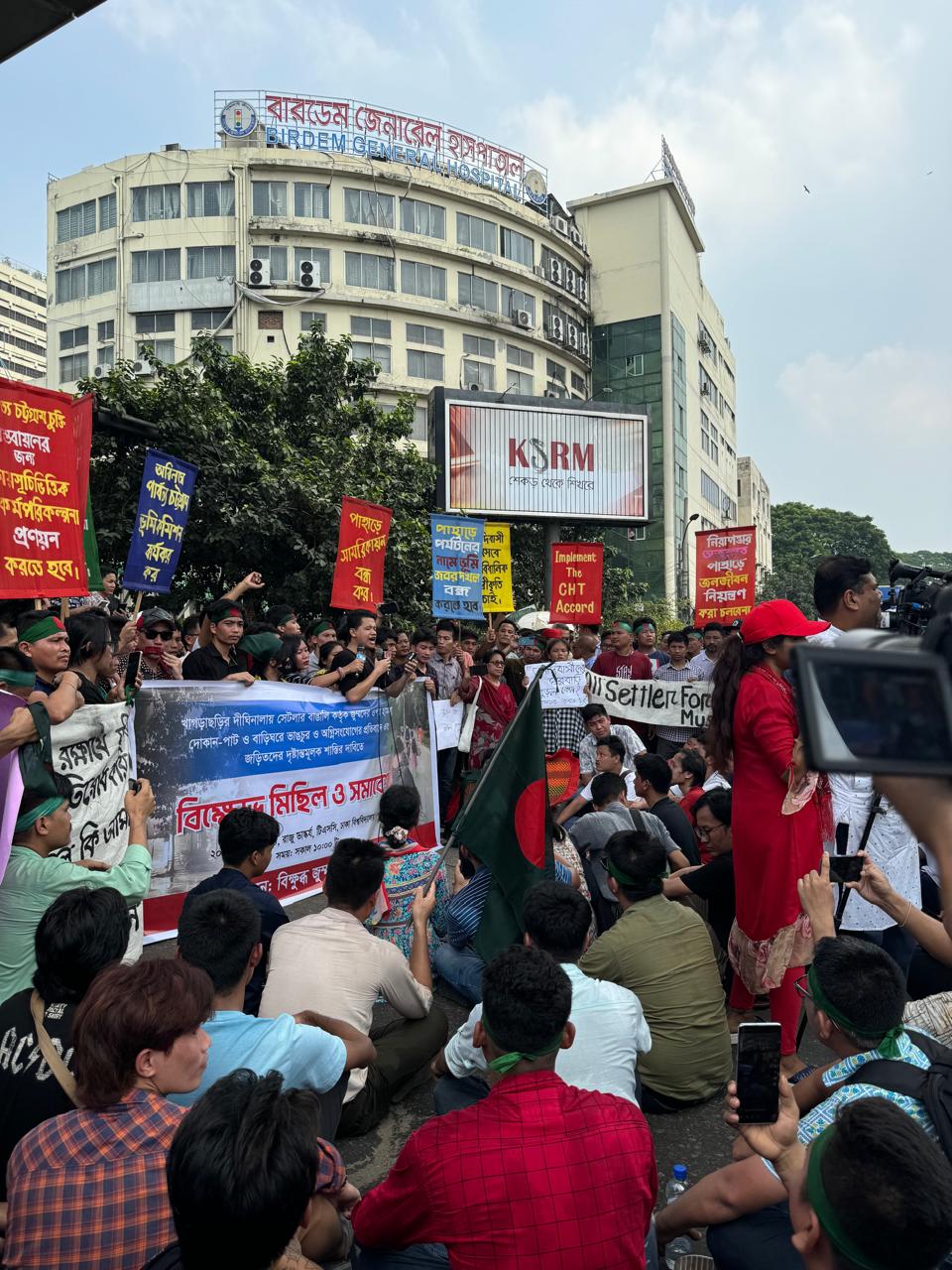
Photo by Satej Chakma.
Pallab Chakma referred to the killing of an Indigenous youth in Rangamati, stating that videos showing the perpetrators who were involved are publicly available on social media. He sees the lack of arrests as evidence of a culture of impunity in Khagrachari and Rangamati districts. The attacks have sparked widespread fear and outrage among Indigenous communities, who demand justice and protection. Human rights organizations are calling for immediate action to prevent further violence and safeguard the rights of the Indigenous Peoples in the CHT. As tensions continue to simmer, the situation remains volatile, with many fearing that without significant intervention, the violence may escalate further.
Human rights organizations are urging the government to take immediate action to prevent further violence and address the systemic issues that continue to fuel conflict in the region. The International Work Group for Indigenous Affairs (IWGIA) issued an urgent alert to the interim government of Bangladesh, demanding an investigation into the role of the military personnel who failed to prevent the attacks and calling for the demilitarization of the area to ensure the safety of the Indigenous population. Additionally, we request a thorough investigation into the death of the Bengali individual, with those responsible brought to justice.” Similarly, Amnesty International has called on the Bangladeshi government to end mob violence immediately, work to prevent further escalation of violence in the area and address their underlying causes.
The recent tragic incident is the latest in a long history of conflict between the Indigenous Peoples and Bengali settlers in the region, which remains unresolved despite the CHT Accord signed on 2 December 1997. Since the CHT Accord, there have been more than 12 incidents of settlers attacking Indigenous Peoples and setting fire to their homes, businesses, and temples.
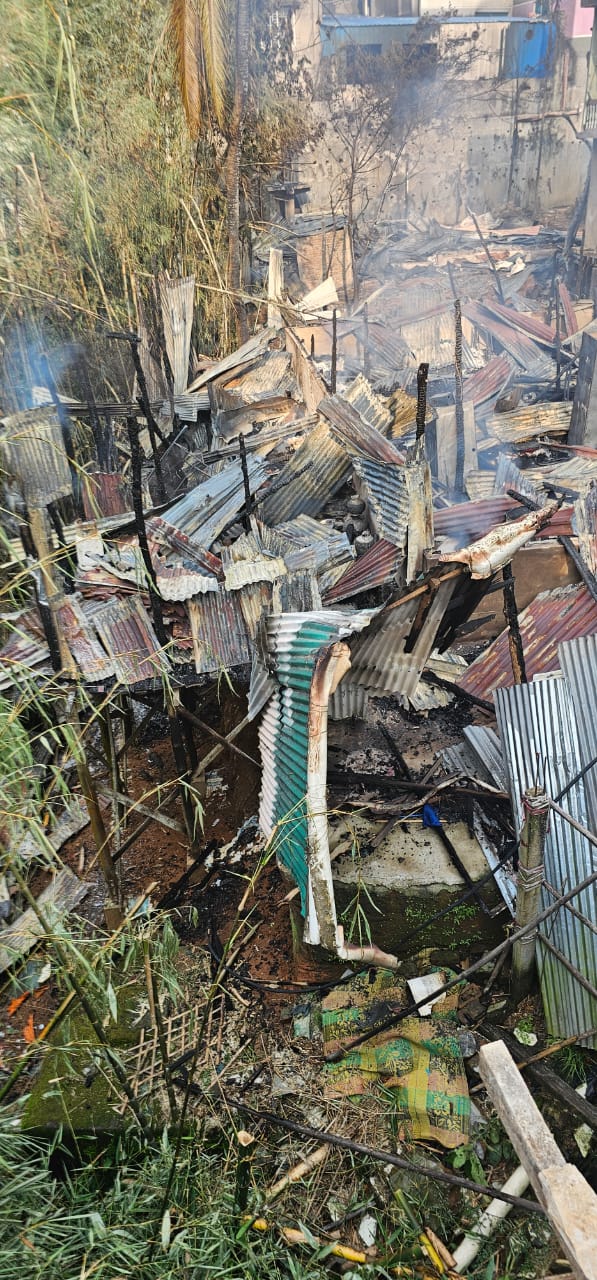
Photo by Ripon Changma.
Satej Chakma, a local journalist, says, "We have received reports that military-backed Bengali settler communities have carried out at least twelve massacres. These incidents remain uninvestigated, and the perpetrators remain unpunished. The incidents, which occurred 26 years after the agreement's signing, demonstrate the systematic efforts of law enforcement agencies to marginalize Indigenous Peoples in the CHT despite the unfulfilled main provisions. Eleven Indigenous Peoples, including the Chakma, Jumma, and Tripura, reside in the CHT, which the government has classified as a “Tribal-inhabited area.” Historically, the CHT was primarily a Tribal region, but India's partition awarded it to Pakistan. Between 1979 and 1983, Pakistan resettled approximately 500,000 illegal Muslim plain settlers, reducing the indigenous population to a minority. These settlers comprise more than 50 percent of the region's population today.
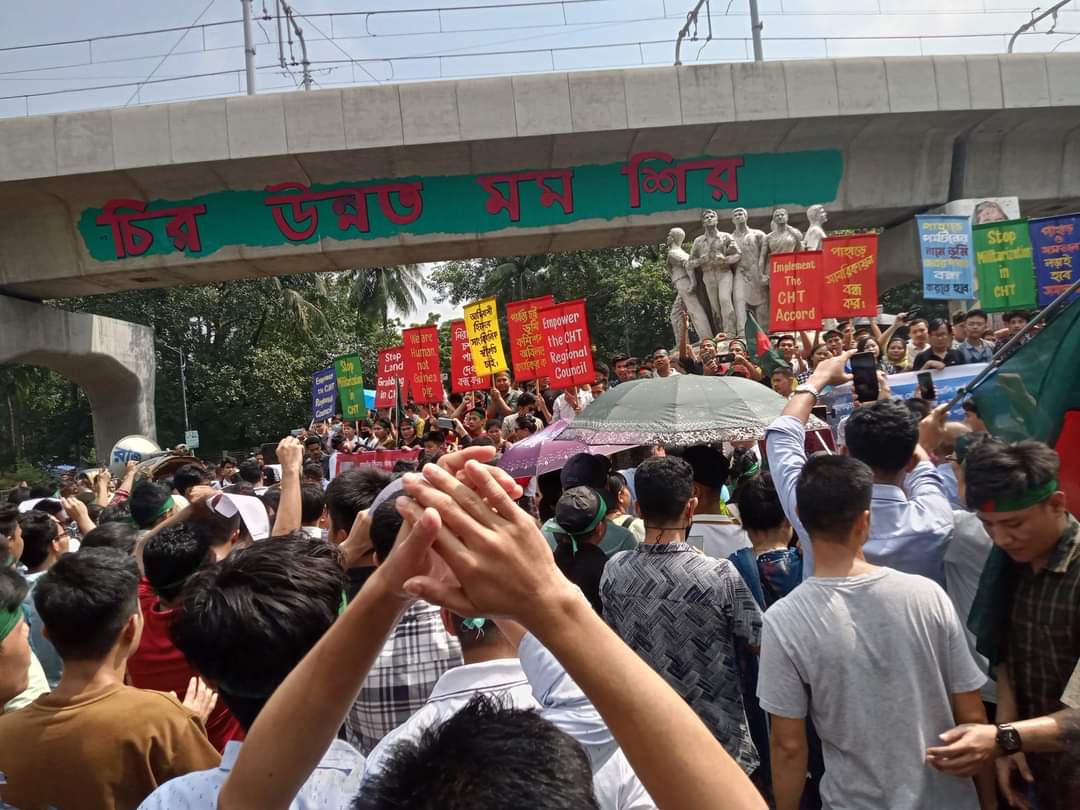
Photo by Satej Chakma.
After the Sheikh Hasina government fell on August 8, 2024, Nobel Peace Prize laureate economist Dr. Mohammed Yunus took over as chief caretaker of Bangladesh's interim government. However, lawlessness has prevailed. The CHTs have over 400 military camps and six cantonments, a crucial issue in the Accord. The Accord has not addressed the withdrawal of military camps and settler Bengali communities, ensured land rights for Indigenous Peoples, or empowered Indigenous Peoples through self-determination. Recent attacks have brought attention to the suffering of the Jumma and Chakma communities. Calls for peace and reconciliation are increasing, but it remains uncertain whether the government will take meaningful action to protect the rights and dignity of the Indigenous Peoples in the CHT.
Pallab Chakma emphasizes, "There is an urgent need to take immediate action to protect the Indigenous Peoples and fully implement the CHT Accord, prioritizing their safety and taking urgent steps to bring peace to the region."
Top photo by Satej Chakma.

